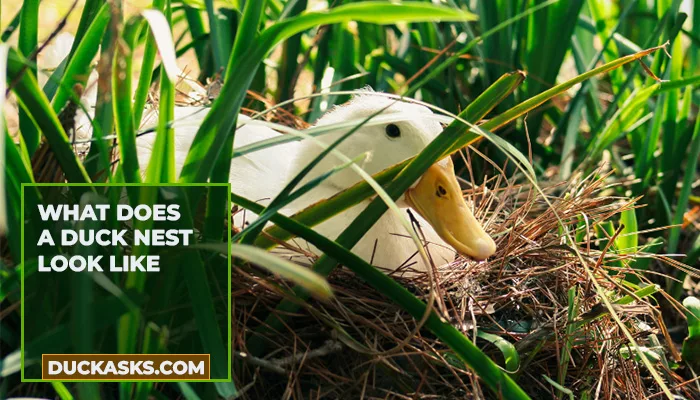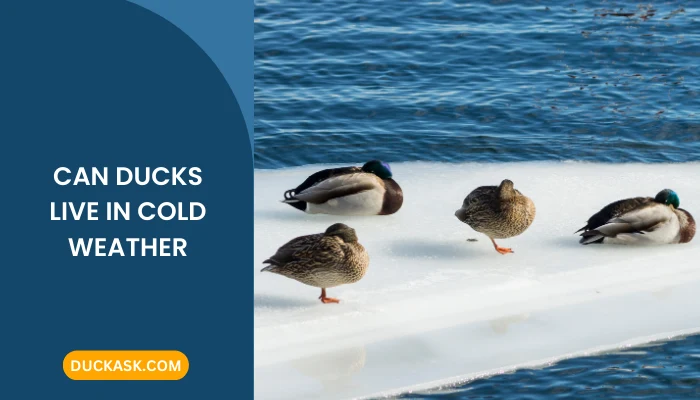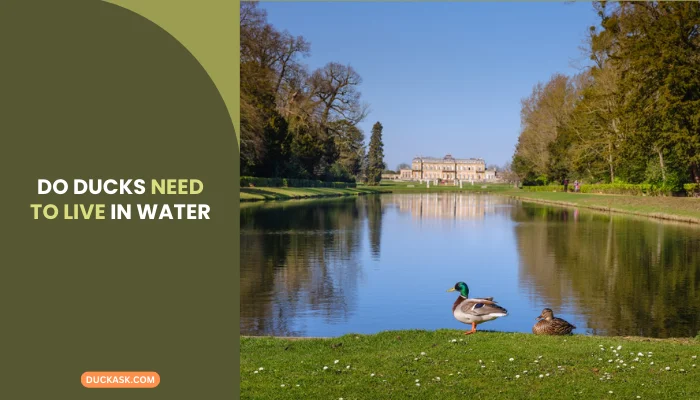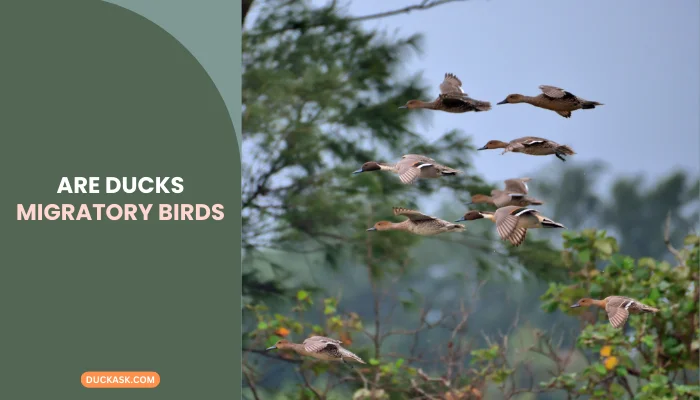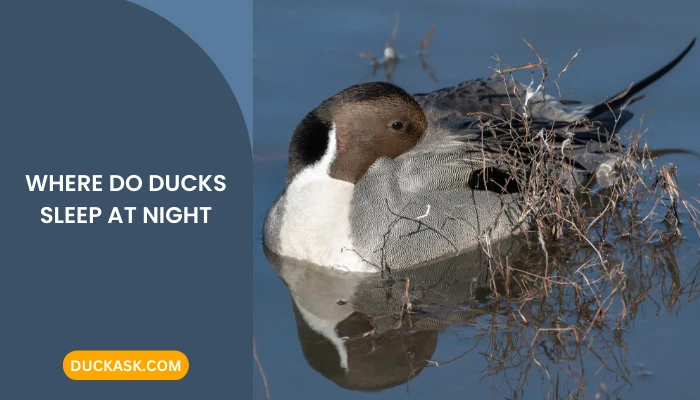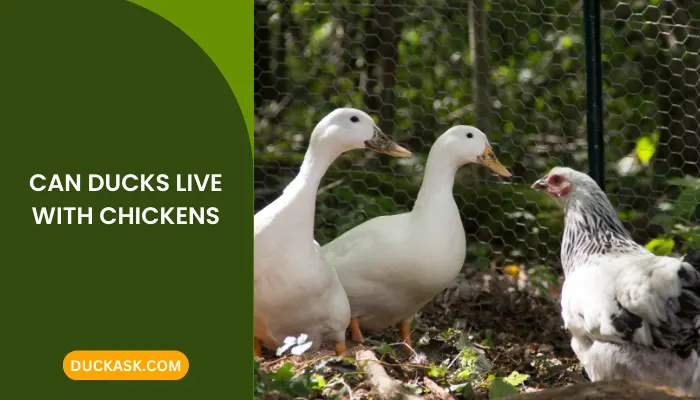Why Do Ducks Nest Away from Water?
Given that ducks are waterfowl and depend on water for food, transportation, and predator protection, this issue could sound confusing. Some ducks, however, decide to build their nests farther from bodies of water for a variety of reasons.
Why do ducks nest away from water if they spend all of their time swimming in rivers and lakes? Simply put, ducks build their nests distant from bodies of water to Lower the danger of predation, discover other food sources, lessen competition, protect against floods, and a host of other environmental and behavioral factors.
Continue reading to find out more about why ducks build their nests distant from water. This article will examine the variables that affect nesting decisions as well as the benefits and difficulties of nesting inland.
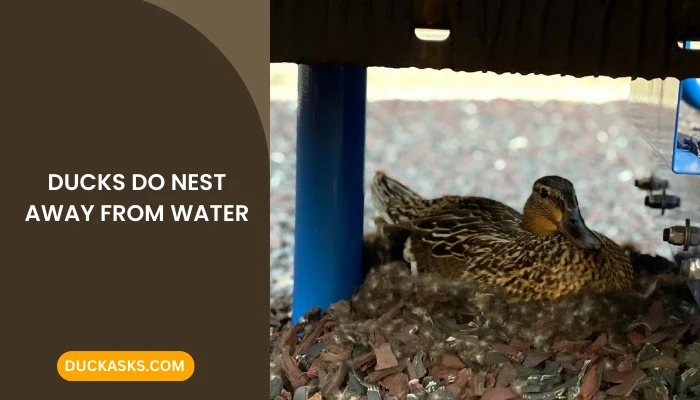
Want to learn more about ducks habitat:
How Far Away from Water Do Ducks Typically Nest?
Due to their need on lakes and rivers for both food and fleeing from predators, ducks often build their nests adjacent to bodies of water. The precise distance can change based on the type of duck and the particular habitat. However, the following basic rules apply –
Near Water
Depending on the type and habitat, a duck’s exact distance from the water might change. For instance, some species, like wood ducks, may build their nests hundreds of feet from any body of water.
However, the majority of duck species nest a few hundred feet or less from water. Due to their close proximity, they can easily get food and provide a safe refuge for their ducklings in the event of danger.
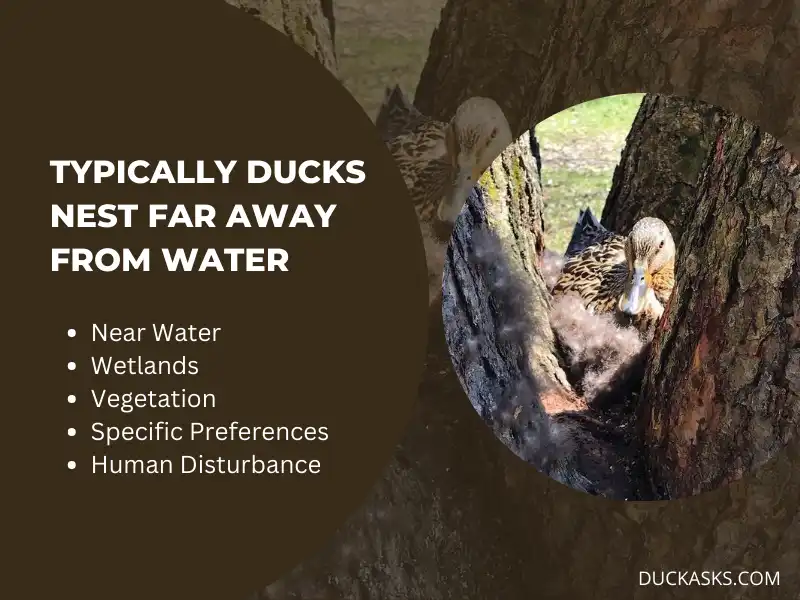
Wetlands
These areas offer food, cover, and nesting grounds for ducks, among other advantages. Numerous duck species choose wetlands, including marshes, ponds, lakes, and rivers, for their nesting grounds.
The thick foliage found in wetlands frequently helps to hide duck eggs from predators. Furthermore, marshes are frequently found close to food supplies, making them perfect duck nesting locations.
Vegetation
Ducks often select nesting sites that offer some form of natural cover or vegetation for concealment and protection.
This vegetation can include tall grasses, reeds, cattails, or shrubs, which protect the nest from predators and give the ducklings a secure place to hide.
Specific Preferences
Some duck species have more specific nesting preferences than others. For example, wood ducks often nest in tree cavities near water. As a result, they may build their nests far from predators.
On the other hand, mallard ducks often build their nests on the ground in thick foliage close to the water.
Human Disturbance
Ducks can adapt to various environments, including urban areas, and may nest near human-made bodies of water, such as ponds in city parks or golf course water hazards.
However, they still prefer locations that offer some level of seclusion and safety.
How Does Human Activity Affect Duck Nesting Locations?
Human activity can have significant impacts on duck nesting locations, which can, in turn, affect duck populations. Here are some ways in which human activity affects these nesting sites –
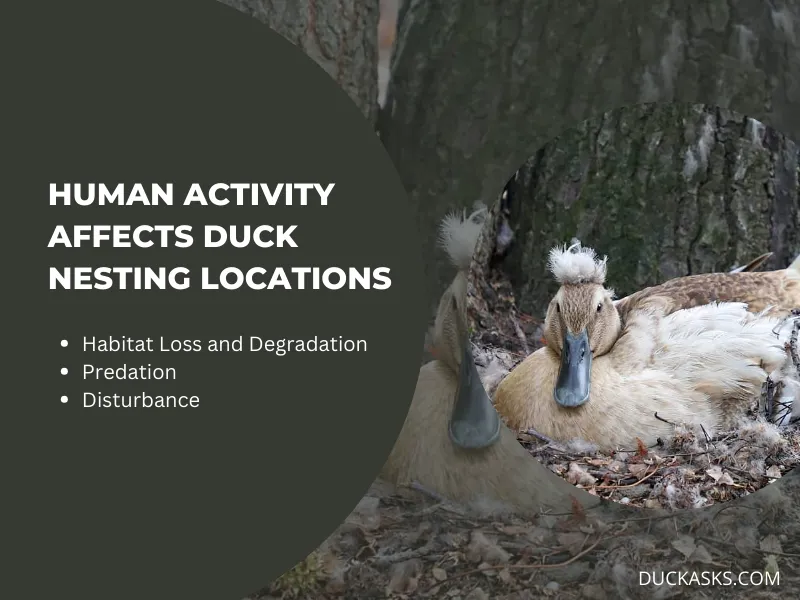
Habitat Loss and Degradation
Human activities such as urban development, agriculture, and pollution can lead to the destruction and degradation of duck nesting habitats. Wetlands, which are crucial for many duck species, are often drained or converted for human use.
This loss of habitat can force ducks to seek nesting areas in less suitable locations or abandon nesting altogether.
The construction of roads, buildings, and other infrastructure can damage or fragment wetland habitats, which are crucial locations for duck breeding.
Agricultural practices, like wetland draining and the use of pesticides, can also make them less suited for nesting.
Pollution from industrial and agricultural sources can contaminate water bodies, rendering them unsafe for ducks to nest in.
Predation
Human activity can inadvertently increase predation on ducks. Pets like cats and dogs, when left unsupervised near water bodies, may prey on ducklings.
Additionally, human development can create new opportunities for predators by providing hiding places or access to food sources near nesting sites.
Domestic cats and dogs, especially when they roam freely near wetlands or other duck nesting areas, can pose a threat to ducklings.
Disturbance
Human presence and activities can disturb ducks and deter them from nesting in specific areas. Loud noises, bright lights, and human traffic near nesting sites can cause ducks to abandon their nests, leaving their eggs vulnerable.
Activities like boating, fishing, and hiking in or near wetlands can disturb ducks and disrupt their nesting behavior.
Are There Any Ecological Factors that Influence Ducks to Nest Away from Water?
While ducks generally prefer to nest near water due to the advantages it offers, there are indeed some ecological factors that can influence ducks to nest away from water –
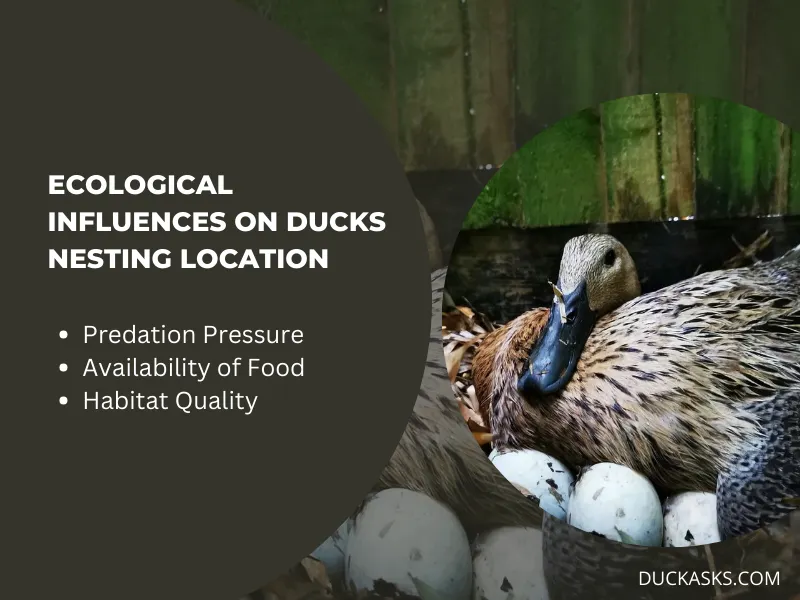
Predation Pressure
Although nesting near water can lower the danger of predation, certain species of duck have evolved nesting techniques to escape specific predators.
To reduce the threat of terrestrial predators like raccoons and snakes, wood ducks are known to nest in tree cavities, frequently some distance from water.
When the ducklings are ready, these cavity-nesting ducks rely on their capacity to fly directly from their nests to the water.
Availability of Food
While water bodies offer a wide range of food sources, some duck species are adapted to nest in areas where their preferred food sources are more abundant away from water.
For instance, cavity-nesting ducks, like wood ducks, may find suitable food sources, such as acorns or insects, in wooded areas near their nesting sites.
In such cases, they may choose nesting locations that provide ready access to these food sources.
Habitat Quality
Ducks are more likely to select nesting sites in areas with high-quality habitat, which includes dense vegetation and an abundance of food. If suitable habitat is available away from water, some duck species may choose to nest there.
For example, mallards have been known to nest in grassy fields or agricultural areas if these locations offer suitable nesting conditions and an ample supply of food.
What Are the Advantages for Ducks to Nest Away from Water?
While many duck species prefer to nest near water for various reasons, some ducks have evolved to nest away from water, and there can be advantages to this nesting strategy.
Here are some advantages for ducks to nest away from water –
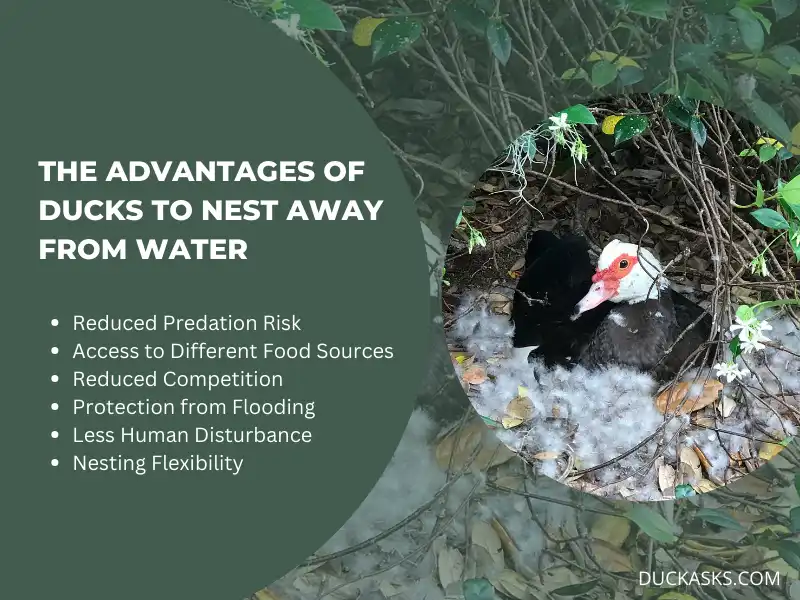
Reduced Predation Risk
By creating nests far from water sources, aquatic and semi-aquatic predators can be warded off.
Predators, including raccoons, snakes, and many fish species that are frequently found near water, are less likely to target ducks that nest in tree cavities or other high areas distant from water.
Access to Different Food Sources
Ducks nesting away from water may have access to different types of food sources that are abundant in their chosen habitat.
For example, ducks nesting in wooded areas may find a variety of insects, acorns, and seeds, which can provide a more diverse diet for both adult ducks and their ducklings.
Reduced Competition
Nesting away from water may reduce competition for food and nesting sites with other waterfowl species that prefer to nest near water. This can lead to less competition for resources, which can benefit the survival and growth of ducklings.
Protection from Flooding
Nesting away from water can protect nests from flooding, especially during periods of heavy rainfall or rising water levels.
Elevated nesting sites, such as tree cavities, can provide a more stable and drier environment for incubating eggs and raising ducklings.
Less Human Disturbance
Ducks that nest away from water may experience less human disturbance, as these locations are often less frequented by people engaged in water-related recreational activities. Reduced disturbance can contribute to better nesting success.
Nesting Flexibility
Nesting away from water provides ducks with more flexibility in choosing suitable nest sites. This adaptability allows them to exploit a wider range of habitats and respond to changing environmental conditions.
What to Do If You Find a Duck Away from Water?
If you find a duck away from the water, assess the situation carefully. Determine if the duck is alone or with ducklings and whether it appears injured or sick.
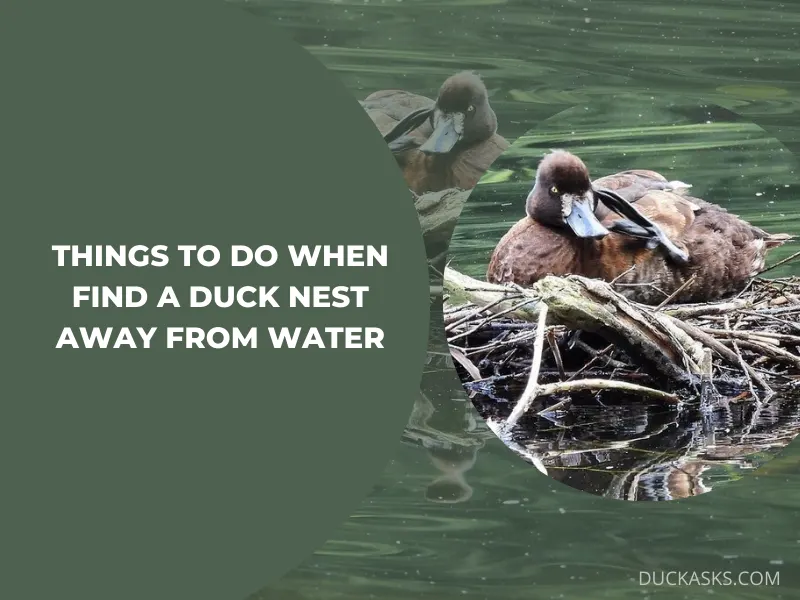
Given that the duck is alone itself and seems healthy, it suggests that it is either foraging or exploring. It’s better to leave the duck alone in these situations because it can frequently make its way back to the water on its own.
However, if you see a duck with ducklings, don’t bother them. Mother ducks fiercely protect their offspring and may abandon the nest if they sense danger.
If the ducklings can follow their mother back to the water, it is preferable to leave them alone if at all feasible.
If it is hurt or ill, call a wildlife rehabilitator immediately away. Wildlife doctors have the skills and equipment needed to care for sick or hurt animals. Attempting to care for the duck yourself can worsen the situation.
Conclusion
In summary, the answer to the question – why do ducks nest away from water is simply that ducks are adaptable creatures that can nest near or away from water, depending on their needs.
Some ducks choose to nest away from water to avoid predators, find different food sources, or reduce competition. Nesting away from water can also protect ducklings from flooding and human disturbance.
References:
- https://www.reconnectwithnature.org/news-events/the-buzz/do-not-interfere-with-duck-goose-nests/
- https://helpwildlife.co.uk/advice/nesting-ducks/
- https://news.prairiepublic.org/podcast/natural-north-dakota/2022-06-04/ducks-nesting-away-from-water
- https://www.ducks.org/conservation/waterfowl-research-science/understanding-waterfowl-duck-nesting-ecology
- https://www.researchgate.net/publication/261826106_Effects_of_Human_Disturbances_on_the_Behavior_of_Wintering_Ducks
Image Credits:
- https://www.instagram.com/buttercream_dingdong/
- https://www.instagram.com/huntnfishnut/
- https://www.instagram.com/aperture.kf/
- https://www.instagram.com/homegrownandhopeful/
- https://www.instagram.com/kristie_o/
- https://www.instagram.com/jess.duckenfield/

